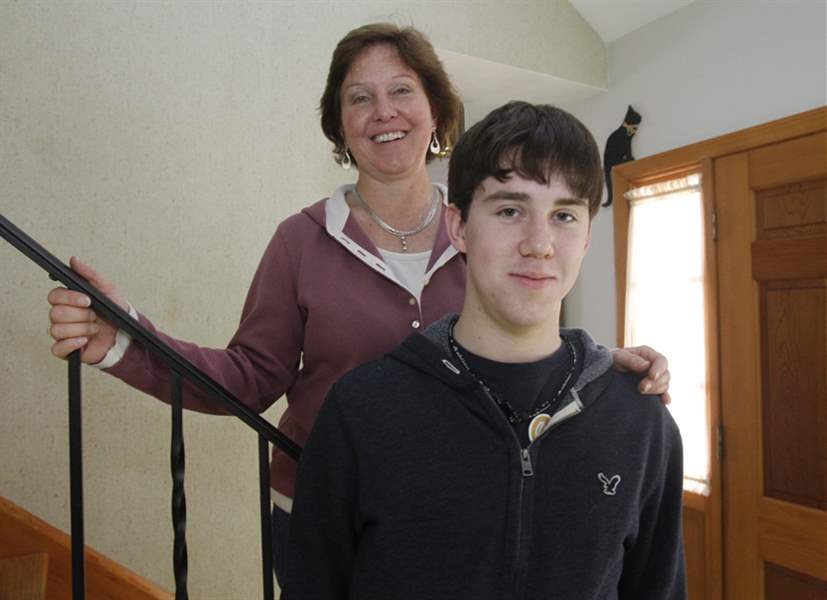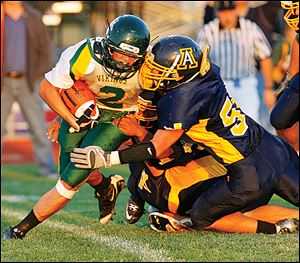
Concussions: Know the score
Common sports injury can have serious consequences
3/20/2011
Christopher Drees, 16, a junior at Central Catholic High School, with his mother Suanne in their Toledo home, has had three concussions. The most recent, and debilitating, incurred during soccer practice last August.
THE BLADE/JETTA FRASER
Buy This Image

Christopher Drees, 16, a junior at Central Catholic High School, with his mother Suanne in their Toledo home, has had three concussions. The most recent, and debilitating, incurred during soccer practice last August.
Not so anymore.
Mr. Natyshak, 47, coaches youth hockey. Last year when one of his players was knocked out, the boy came off the ice and was diagnosed the next day and treated by a doctor before returning to the rink. "There's a greater awareness of concussions and what multiple concussions can do," Mr. Natyshak said.
This attitude shift — and treatment approach — is "a complete change that's come in the last three or four years," said Dr. Roger Kruse, medical director of ProMedica Sports Care. "If a coach is in doubt about whether there's a concussion, a player should never return to play."
Professional and collegiate sports have no choice but to take concussions seriously when marquee players like the National Hockey League's Sidney Crosby and football's Brett Favre get hurt.
Crosby suffered a concussion in January and still isn't playing. No one knows when — or if — he'll return this season. Favre missed the last game of his career because of a concussion.
This greater awareness of concussions and their life-changing consequences has now filtered down to youth sports as well. That's good news for our kids.
WHAT ARE SIGNS OF A CONCUSSION?
Symptoms usually appear immediately, but can come on hours or even days later. If your child hit his head and shows any of these symptoms, consult a physician.
Signs observed by parents, coaches, or guardians
- Appears dazed or stunned
- Is confused about an assignment or position
- Forgets an instruction
- Is unsure of the game, score, or opponent
- Moves clumsily
- Answers questions slowly
- Loses consciousness (even briefly)
- Shows behavior or personality changes
- Can't recall events prior to the hit or fall
- Can't recall events after the hit or fall
Symptoms reported by athlete
- Headache or "pressure" in the head
- Nausea or vomiting
- Balance problems or dizziness
- Double or blurry vision
- Sensitivity to light
- Sensitivity to noise
- Feeling sluggish, hazy, foggy, or groggy
- Concentration or memory problems
- Confusion
- Does not "feel right"
Source: U.S. Department of Health and Human Services, Centers for Disease Control and Prevention
Growing problem
The American Academy of Pediatrics last year published a report on youth concussions, the first of its kind to address the adolescent and pediatric population. It found that 8 to 19-year-olds made more than half a million emergency room visits for concussions between 2001 and 2005.
About half of those were sports-related, and of those, about 40 percent were for children between 8 and 13 years old. Team-related concussions doubled between 1997 and 2007 in 8 to 13-year-olds and more than doubled in older teens, the report said.
Dr. Mark Halstead, one of the report's lead authors, chalks up the rise to better reporting and awareness. "They're making a culture change in sports," said Dr. Halstead, a member of the academy's Council on Sports Medicine and Fitness. "It's an injury to your brain, and we need to take it seriously."
Any jolt to the head — from falling off of a skateboard to running into something — can cause damage to normal brain function.
"It's like a computer that has a virus and is not functioning appropriately," Dr. Halstead said.
Delayed symptoms
Because a child's immature brain is much more vulnerable, children often get more symptoms and take longer to recover than adults who have concussions.
Fewer than 10 percent of kids lose consciousness. Since there's no structural damage, MRIs or other imaging techniques will appear normal. That's why it's important to watch for other symptoms, which include cognitive, physical, sleep, and emotional problems (see sidebar for a full list). Symptoms usually appear immediately but can sometimes show up hours or even days later.
When Christopher Drees, 16, of West Toledo, hit a header incorrectly at soccer practice last fall he didn't think too much of it. He sat out a bit and went back in. But that night the Central Catholic High School junior felt dizzy and nauseated. The next morning he couldn't tell which way to turn the tap to get cold water. "It was pretty scary," he said. An emergency room visit confirmed a concussion.
Most kids can count on getting back to full throttle within seven to 10 days. But for Christopher, who was out of school for a week and a half, the symptoms didn't abate completely. He played soccer again about a month after his initial injury, but still had headaches and trouble concentrating.
Since he was being treated at the Cleveland Clinic for hip issues, his physician recommended he see someone at the facility's Sports Health Center. After speaking with a doctor there, "the light bulb went off," said his mom, Suanne. "He should never have gone back [to playing]."

A greater awareness of concussions and their life-changing consequences has filtered down to youth sports.
Now he is slowly easing back into physical and mental activity. That should be the protocol for all concussions, say the medical experts.
"The two most important things after a concussion are physical rest and mental rest," Dr. Kruse said. "You want to allow the brain to heal." Don't heed this advice and you run the risk of aggravating symptoms.
The mental rest is news to most folks. This could mean taking days off school, reducing your workload, and avoiding reading, video games, and multitasking. Getting kids to comply with these recommendations isn't easy.
"Do they ever do it completely?" Dr. Kruse said. "No. But if we can explain that the brain will get better sooner, then we have a fighting chance."
How soon can kids return to sports? The AAP report recommends that an athlete be clear of all symptoms at rest before attempting any sort of physical exertion. Exercise, including sport-specific drills, should be tried gradually over a period of days and monitored by a parent or health professional. If the athlete remains symptom-free, he or she is good to go.
Going back too soon can be risky, Dr. Halstead said. If children get another concussion before symptoms from the first have cleared, they can suffer a condition called second-impact syndrome.
Young athletes seem to be at greatest risk for this condition, which can result in brain swelling or even death. Four or five kids die each year because of this type of head injury, Dr. Halstead said.
Legislation
Everyone from high school sports associations to state governments is waking up to the seriousness of concussions in young athletes. Washington State, in 2009, became the first of 11 states to pass a concussion law, which calls for concussion education and for all young athletes to be cleared by a medical professional before returning to play. Ohio introduced similar legislation this month.
It's clear, based on studies of adult athletes, that concussions can cause memory problems, higher rates of depression, and even brain disease. No one's sure, though, what the long-term consequences are for children
FOR MORE INFORMATION
- The Centers for Disease Control and Prevention: You can download fact sheets and educational information. www.cdc.gov/concussion/
- American Academy of Pediatrics: Read the full report on youth concussions at http://www.aappolicy.aappublications.org/cgi/content/full/pediatrics;126/3/597
"Kids can get back to normal, but are they truly normal?" Dr. Halstead said. "We know they're more vulnerable to having another concussion."
Knowing when to sideline an athlete permanently can be a tough call. Medical professionals weigh many factors, including how often concussions have occurred, how severe they were, and how long symptoms persisted.
Unfortunately, you can't really prevent concussions. You may have fewer and less severe injuries by learning proper techniques and wearing safer helmets. But safety measures only go so far. "The brain moves around in the skull," Dr. Halstead said. "Having something on the outside won't necessarily help that."
The best weapon? Education. Concussions still are under-reported, Dr. Halstead said. So it's important for everyone from coaches to parents to the athletes themselves to know what to look for and to seek help when they suspect a concussion.
Mrs. Drees, Christopher's mother, couldn't agree more. After learning more about concussions, she realized that her son probably suffered two other head injuries in junior high. "We didn't know enough to take him to the ER then," Mrs. Drees said. "We had no clue that he had a concussion."
When Chris donned his soccer uniform once again, Mrs. Drees couldn't watch him. " I'd be happy if he didn't play," she said. But that's not an option for her sports-loving son: "I definitely want to play."
At least now Mrs. Drees knows her son won't step back on the field until he and his doctors know it's safe.